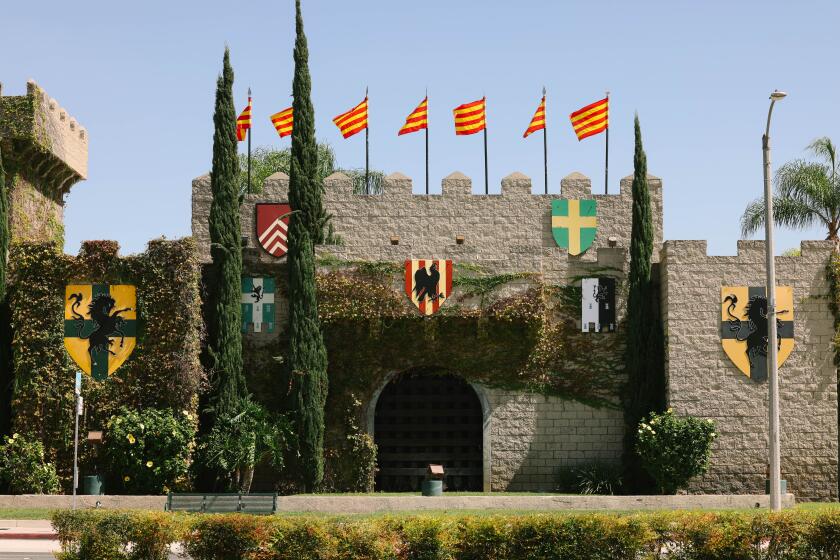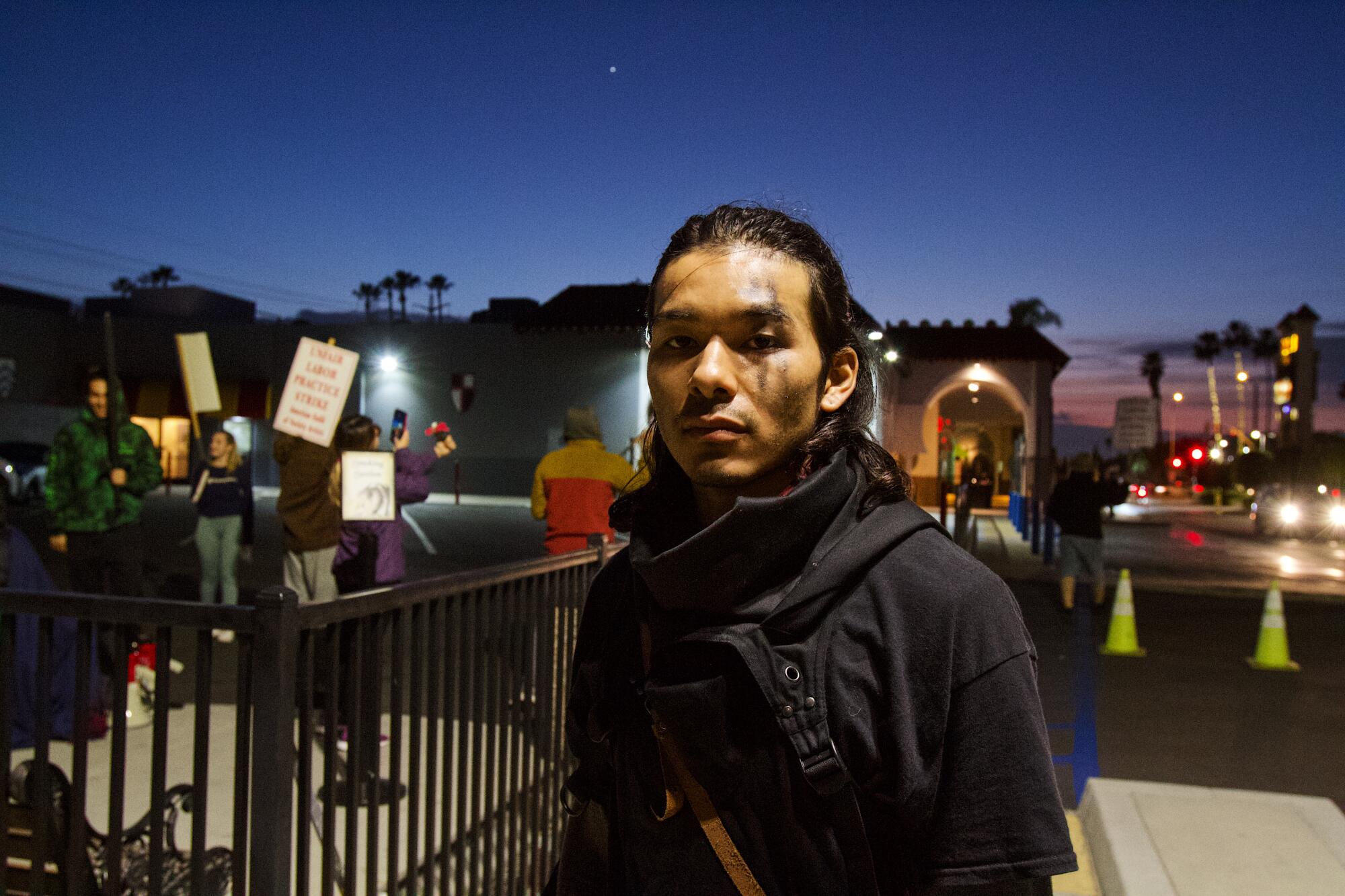
- Share via
Newly unionized cast members are on strike at the Buena Park location of Medieval Times this week, calling for increased wages, better workplace conditions and less of what multiple cast members believe to be hostile responses from management at the world-famous dinner-theater chain.
On Monday the scent of roast meat drifted through the parking lot as the sky dimmed. Nearly 20 union queens, knights, royal advisors, trumpeters and squires gathered in and near the smoking section, some wrapped in blankets, some clutching hot drinks on the 57-degree night. One played a flute, carnations attached at the far end, while two others sparred with fake swords. Some took turns in rotation flanking the entryway to the parking lot, waving at vehicles headed to the show and an evening of roast chicken, basted potatoes and corn on the cob all eaten hands-only with steins of ale at the ready. The picketers hoisted signs for colleagues and guests to read on their way in: “UNFAIR LABOR PRACTICE STRIKE” printed in bold, red letters.
For the record:
1:00 p.m. Feb. 15, 2023A previous version of this story incorrectly referred to Buena Park as Buena Vista in the lede. This has been corrected to Buena Park.
“We love our jobs,” said Erin Zapcic, who plays Queen Doña Maria Isabella and serves as a steward for the new union. “We’re not happy to be out here. As exciting as it is to take a stand for something, we’re doing this because we felt like we had to. Medieval Times has fought this every step of the way; they have drawn this out as much as they possibly can. And ... they continue to show us their true colors over and over and over again. They have flat-out told us that they can afford to pay what we’re asking, but they don’t want to.”
The strike, which began Saturday, was spurred by a series of unsuccessful wage negotiations in addition to the deletion of hundreds of supposedly pro-union comments on social media and an October lawsuit that alleged trademark infringement on the union’s part. In December the Buena Park performers — who voted to unionize in November — said they learned many of their counterparts throughout the country would be given sizable raises in 2023, while their own requests for hourly wage increases were going, in some cases, entirely ignored.
Medieval Times LLC did not respond to multiple requests for comment.
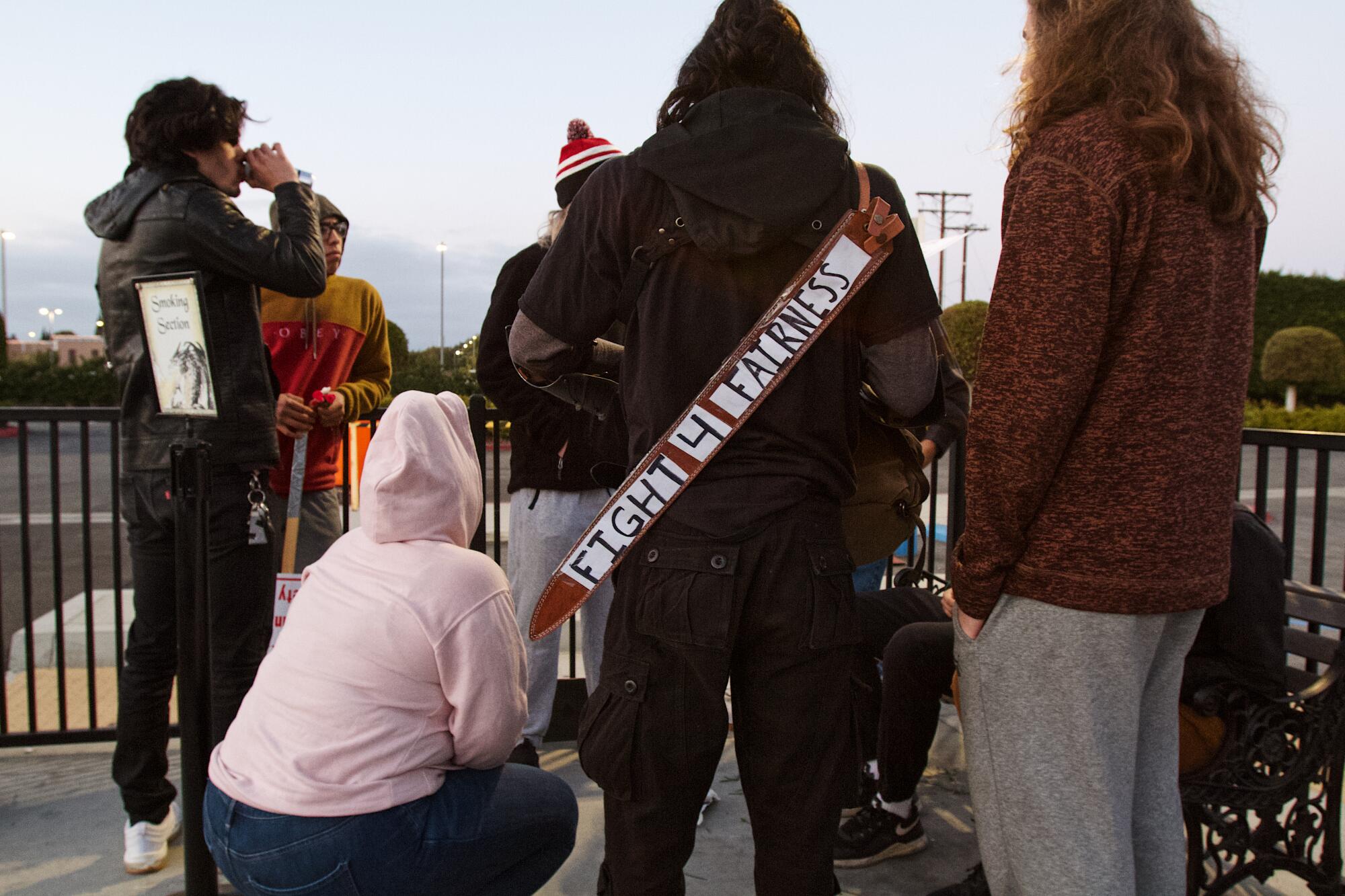
According to Zapcic, non-union castles were given raises upward of 20%; at the union’s first bargaining session, a representative for the company proposed a 2% raise for speaking cast, no raise for trumpeters, a 2% increase for stablehands, and raises of 2% to 8% for knights — all of whom are included in the union, which is represented by the American Guild of Variety Artists (AGVA). The New Jersey location, which voted to unionize last July, is the only other castle to unionize thus far, and is represented by the same guild.
“AGVA performers at Disneyland who do what these guys do get paid over $33 an hour,” Zapcic said, “and their shows are only 15 to 20 minutes long. [Here] they work hard all full eight-hour days, with lots of breaks.”
The refusal to acknowledge trumpet players — a role that pays $16 hourly — is especially galling to the union’s organizers. Lizbeth Figueroa has been playing for eight years and currently makes just above minimum wage. “They can’t really pick anyone off the street to do my job,” she said. “I don’t think the company sees that. They make it seem as though we’re replaceable when we’re really not.”
A pay increase, she says, would help her to fix her car and further her education. The union is proposing raises that would bring all members at least to Orange County’s hourly living-wage minimum (currently listed at $23.66 for the region by Amy K. Glasmeier, professor of economic geography and regional planning at the Massachusetts Institute of Technology).
The Buena Park castle joins its sister location in New Jersey as the second to unionize.
The first days of the strike, multiple attendees requested refunds after encountering the picket line. All Monday evening many guests expressed their support of the protest, even as they walked in for the performance. One attendee, clad in a cowboy hat and black leather vest, crumpled a strike flier and threw it back at the picketing staff before entering the building — even then, the cast called out to his party, asking them to still tip their servers well.
Multiple picketers said Medieval Times LLC has flown in cast members from other castles, including those from the nearest location, in Scottsdale, Ariz.
Graham Wojcik, who brought levity to the picket line by playing the flute for co-workers and guests, was knighted just three days before the strike — the early Saturday show was only his third performance before he and the other picketers walked out, and an experience he called “very, very nerve-racking.” Another picketer said that one of the queens who chose not to join them snickered at them as they walked out that day. But many of those picketing feel the strike is worth the discomfort in the long run.
“It’s $18.50 to just jump off a moving horse that goes up to like 20, 30 miles an hour,” Wojcik said. “Something like this especially should have union protections. You get hurt.” Wojcik says that everyone he knows who’s gone to perform in the arena, or “in the sand,” has been injured in some way.
Nearby, a knight clad in all black, vertical lines of black paint streaked across his left eye, handed out carnations just as he would in the arena. He was wearing his own armor, purchased at a Renaissance fair, and scrawled “FIGHT 4 FAIRNESS” across a piece of paper taped to an empty sword sheath strapped across his back.
A little more than a year ago, Johnnie Ross IV began as a squire after working as a dishwasher in a Korean restaurant. Within two months he had an apprentice knightship — a quick ascension which he partially attributes to his parkour background. When he became a knight he started earning $18.50 an hour: not enough for the grueling work conditions and danger encountered regularly, he says, especially for the knights who must attempt stunts including jousting with metal-and-wood lances and jumping from moving horses.
He’s been stepped on, and in his first week he says he was kicked in the knee by a horse. Though he was slated to become a knight earlier, it was delayed for six months due to injuries sustained from stunt falls.
“I really enjoy the people who I work with but I also really need it to be safer,” he said. “It’s not just wages in general right now — we’re really striking for the unfair labor practices.… When I was hurt with my [knee] injury, I wasn’t really helped out much. I had just come from a dishwashing job, and I’m just like, ‘I don’t understand anything about getting injured. How am I supposed to do things?’”
He’s hoping the union can not only bargain for raises for all performers, but hazard pay for those who work with live animals. The workers deserve financial security, he says, especially if their injuries remove them from the workforce. According to multiple cast members, because knights are full-time employees, when not acting in the arena they are commonly put to work doing maintenance tasks such as painting or cleaning — even when injured and they cannot otherwise perform.
As the castle’s longest-tenured knight, Bryce Keizer has sustained multiple injuries in his 12 years at the Buena Park location, including a shattered foot when he said a horse crushed him against a brick arena wall as he was riding. His foot has a permanent bolt in it, and will most likely never be the same, he said.
“My foot was a balloon: torn ligament in it, broken bones, and they were having me sit up in the back and clean dirty lights while I was in excruciating pain,” Keizer said. “They’ll try and put you in another department so they could save money instead of just having you rest out.”
Keizer is the highest-paid, non-manager knight and makes $28.50 hourly, and performs in roughly 30 shows per month. On the whole, the Buena Park location performs more often than any other castle in the country.
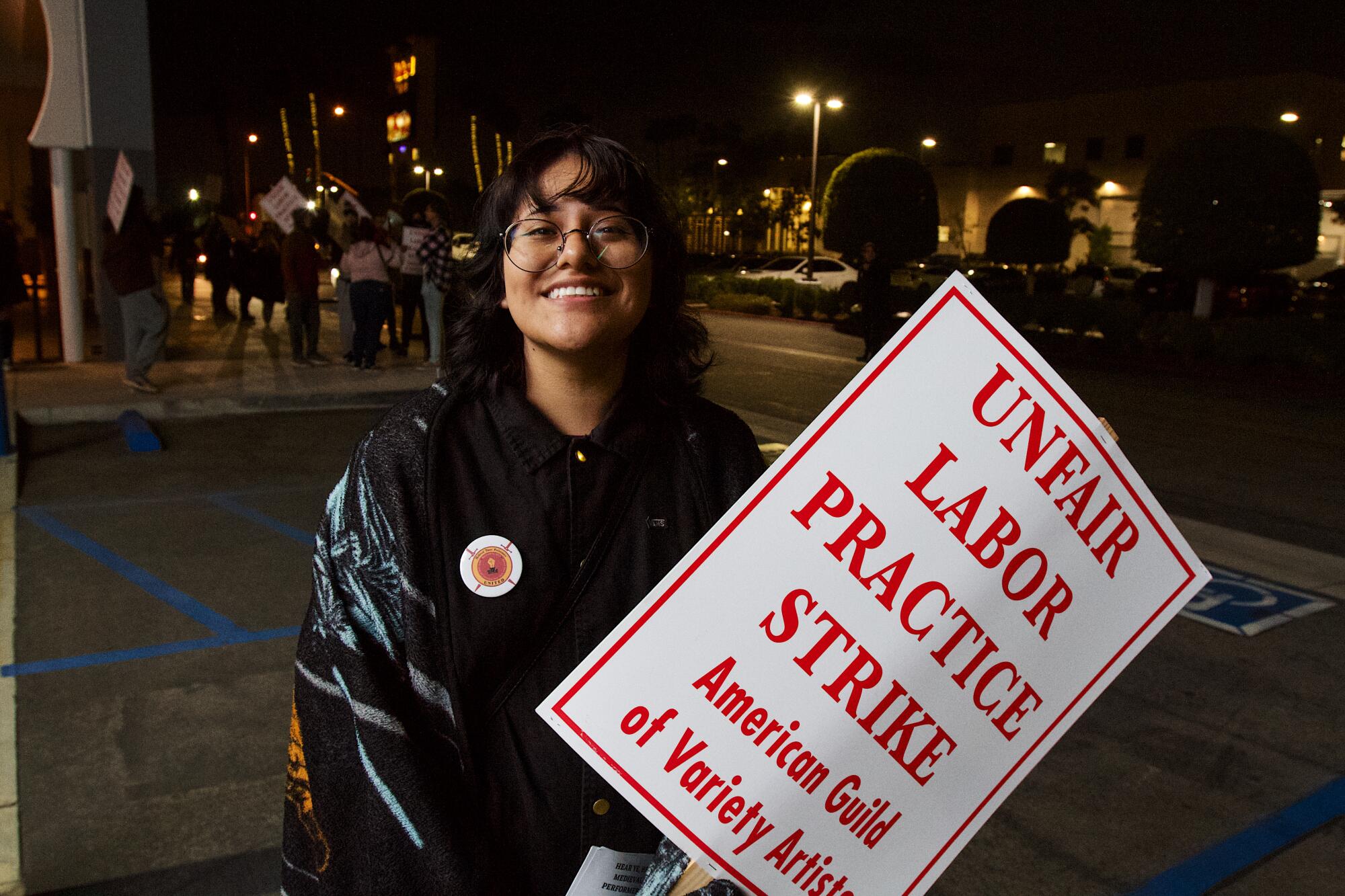
“Specifically our castle makes quite a bit more money than any of the other castles,” said Bradley Whitfield, an employee of the Buena Park castle for about 11 years. “Some of the castles at this time of the year are only open three days a week, and we’re open every day except for Mondays.” (This Monday proved an exception, due to early Valentine’s Day dinner demand.)
Whitfield plays both the Lord Marshal and Lord Cedric, and plans on attending every day of picketing — arriving after his occasional morning shifts as a barista at Starbucks, where he says his hourly rate is more than roughly half of what the knights and squires are paid at his Medieval Times castle. It’s not uncommon for this location’s cast members to hold additional part-time jobs; nearly all interviewed Monday evening do, and many shared that they are barely scraping by but choose to remain due to their love of the show and the bonds they’ve formed not only with their fellow cast mates but also their colleagues in other departments, as well as the horses.
On Monday, Whitfield arrived at 3:30 p.m., hoisting his picket sign while waving at oncoming cars near the entrance to the parking lot, and there he remained all night to greet both colleagues and guests. “It’s nice to wave at our fellow employees as they come in and get thumbs up from them, because that feels good,” Whitfield said. “There’s been a little bit of a rumor going around that we didn’t have a lot of support from a lot of the other departments and staff, and it doesn’t seem to be the case at all.”
All show actors are included in the union, as are the employees referred to as “the stables,” or those who care and handle the horses. According to Whitfield, as of Monday night none of the stables had joined the other cast members on strike.
The castle’s departments not in the American Guild of Variety Artists union include retail, which encompasses the souvenir-photo team; food and beverage; sound and lighting; cash management, which includes ticketing and sales; housekeeping; and event staff. Some members of these other departments, however, have taken up fliers and picket signs despite not being union themselves.
Katherine Calderon holds one of the foam swords sold in the castle’s gift shop, where she works as part of the retail team. In her other hand is a stack of fliers decrying, “HEAR YE, HEAR YE! MEDIEVAL TIMES PERFORMERS ARE ON STRIKE in response to repeated violations of federal labor law by the company.” She’s decided to join her co-workers picketing in a show of solidarity and hope for a better future for employees of the castle.
“What if my son wants to work here? Or what if my grandbabies want to work here?” she asked. “I just feel like you’ve got to think about the future.”
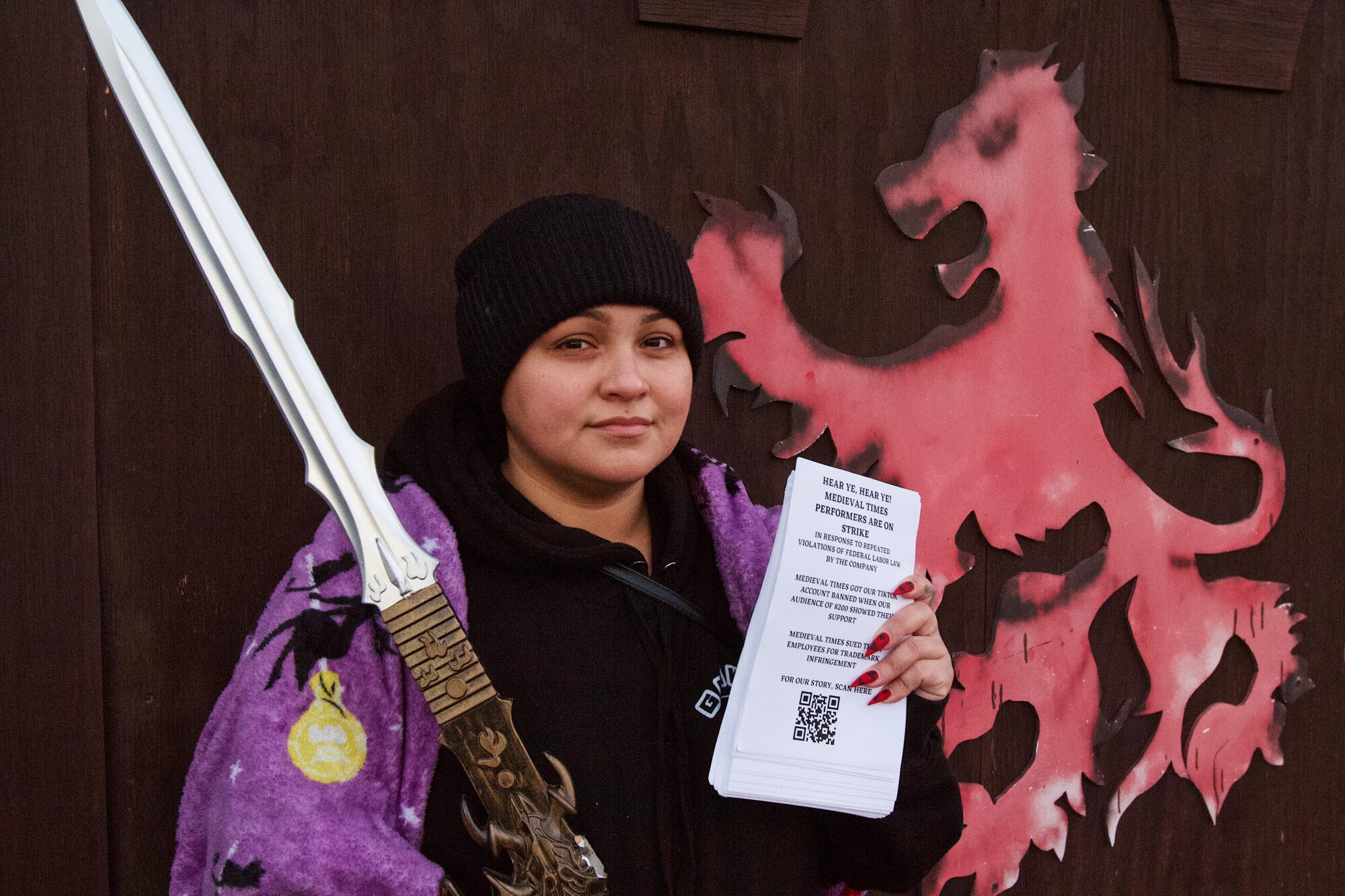
Two non-union colleagues approached her in the parking lot and expressed their regret at not being able to strike alongside her. Multiple employees entering the castle for their evening shift expressed similar sentiments, but could not strike because of the need for pay. Calderon had texted her boss before her shift that evening, alerting them that she was choosing to picket, and says her boss left her text on “read.”
“It’s the least I could do,” she said. “I can’t give them money, but I can stand here.”
More to Read
Eat your way across L.A.
Get our weekly Tasting Notes newsletter for reviews, news and more.
You may occasionally receive promotional content from the Los Angeles Times.
